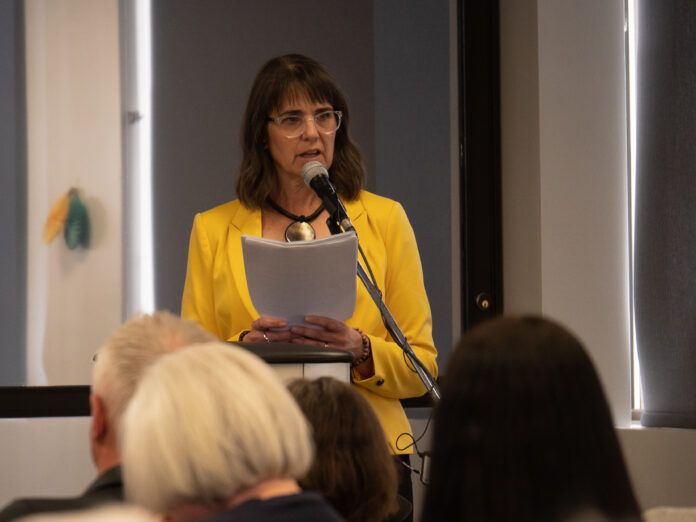The daughter of a Lethbridge man who played a significant role in getting legislation changed for medical assistance in dying presented her perspective on planned death to the Southern Alberta Council on Public Affairs (SACPA).
John Warren spoke to SACPA twice on the subject before he chose medical assistance in dying (MAID) and died peacefully in his home in January this year. His daughter, Tania Stilson, shared her experience with supporting him in his decision at a talk on April 20.
“We focused on the love and not the loss — we had special one on one time or couple time as we needed. We were able to tell him how much we loved him and he us. There was nothing left unsaid and no regrets if you took the opportunity. He was able to say his fond farewells to many—there was lots of conversations, emails, hugs and we called it ‘liquid love,’” she said. “He, nor my mom, nor any of us girls, ever wavered. We all believe strongly in the option of choice and supported him in his.”
She said she could not imagine him passing in any other way and the choice was an act of bravery and empowerment.
Warren was diagnosed with hepatitis B at 70 years old and Stilson said this is when he began thinking about people having a choice over their own death. She said he vowed he would have control over the end of life.
A couple years later, he became vice president of the Dying with Dignity national board and advocated for a change in legislation to allow people to choose death.
“Dad was instrumental in helping Canadians to be able to have the choice of a dignified, compassionate and empowering death through medical assistance in dying, or MAID and when the time came, he was able to make the choice for himself,” Stilson said, adding he resigned from the position was change was made.
MAID is separated into two tracks and Warren was approved for the less common one. Track Two is for people whose natural death is not reasonably foreseeable. He was one of just over 200 people in the country to use Track Two MAID in 2021.
After being approved for Track Two, an applicant must wait 90 days to ensure all treatment options are explored. Stilson said when her father was approved and told he had to wait, it was frustrating.
“It is both my dad’s and my opinion that in the future this needs to be carefully reviewed. I would challenge that people who have applied for track two have also done so with careful consideration, if not more so,” she said. She added he and the family had been talking about MAID for more than a decade and he had tried everything to relieve his pain.
“Trying to explain to friends, work and really society when so little is known about track two especially—there wasn’t really language about what we were all facing. My experience with sharing dad’s choice was gracefully accepted. My one sister and my mom had some rough responses from some folks, which were hurtful and difficult,” Stilson said. “Looking back now, there was a weird sense of being in a fog of grief and then still having the person alongside with us.”
Stilson said it was her hope the talk would encourage people to talk about death.
“I feel so proud of the work he did for Canadians and for peoples’ right to choose. I am happy that in the end, he was able to walk down this path for himself. I am thankful for the continuous conversations about his view on a good death, long before we were all faced with it,” she said.






